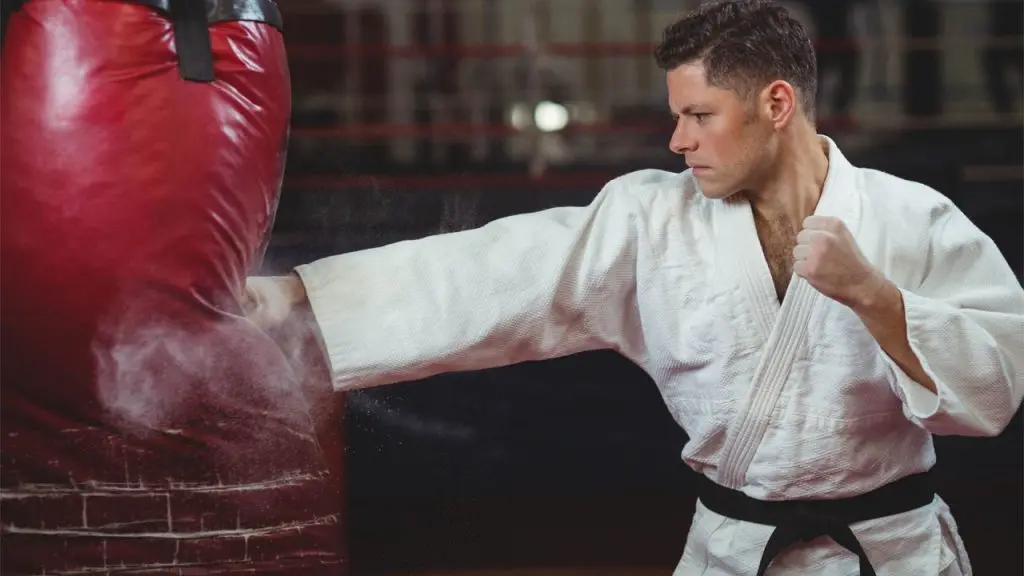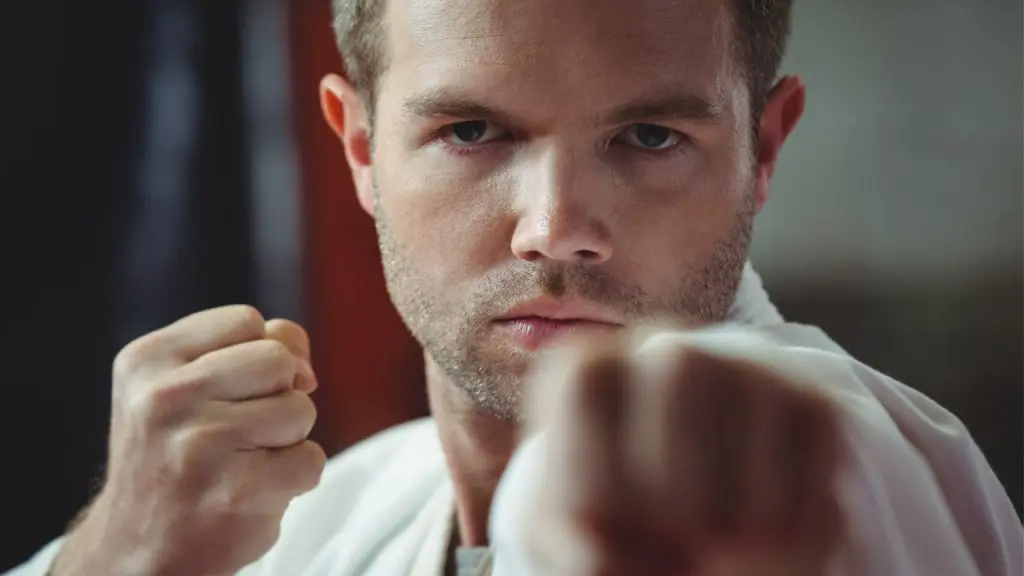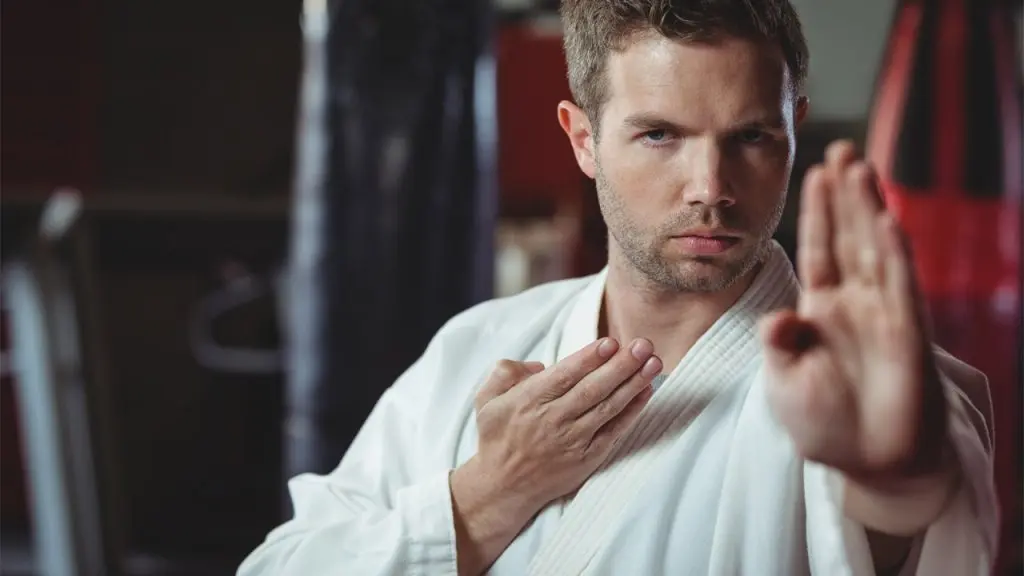Karate training takes time, effort, and dedication, especially for people looking to reach a high level of skill and proficiency. Students learn not only a variety of karate techniques and principles but also the karate philosophy, thought process, and way of life. The belt hierarchy that accompanies most karate training is also known for encouraging slow, steady progress where palpable improvements are rewarded with a new, more advanced belt color.
If you are immersed in the process of learning karate and want your improvements to manifest faster, there are quite a few things you can do. Specific karate training areas can see excellent improvements if you target your training in specific ways and focus on problem areas. With this approach, you would train your body and mind quickly and improve your karate faster.
Table of Contents
Karate Tips for Both Beginners and Experienced Practitioners

1. Practice Karate at Home
Spending time training every day at a reputed karate school and learning directly from an experienced sensei is arguably the best way to develop your karate skills. However, it is important to remember that karate is mainly a striking game, and the physical requirements to get the technique right need intense practice. For every strike and form, there are multiple steps where you have to get the positions and balance of your body just right.
The final aim is to practice these enough so that they become a part of your muscle memory. This is why it can be crucial to get regular practice at home.
Putting together a cumulative home practice routine makes sure that you practice what you learned last while also reiterating past lessons. This keeps things fresh and helps you repeat essential movements until you build up muscle memory, and the movements can happen naturally and organically.
To help with practice at home, you can set a specific time for practice everyday and create a space at home that gives you the right environment to practice with peace of mind. The more you practice at home, the faster you can build up your skills and keep up the progress. You can spend more time focusing on weaker points of your karate technique, too.
2. Private Sessions
Group training definitely has its merits. However, there are times when you need to spend quality time with your sensei one-on-one to clear doubts, work on weak points, and have deep, profound conversations about the philosophy of karate. While you keep up with group classes, you can speed up your learning significantly by booking some private sessions with your sensei or another experienced karate teacher.
During a private session, you would be able to zero in on specific issues in your karate technique and understanding of karate with a skilled master and get highly personalized feedback and advice. If there are flaws in your technique, you would solve them with completely focused attention to detail.
Discussions during private sessions can also help you develop a deeper understanding of some of the more complex philosophical elements of karate and derive important life lessons that can further speed up your progress.
With focused training and discussions during private sessions, your progress can speed up dramatically. This can also work out well if you travel frequently as you can arrange private sessions with reputed karate instructors and even exponents of other martial arts disciplines in different cities to develop your skills further.
3. Invest in the Right Gear
Whether at your karate school or during practicing at home, one of the most important ingredients of successful practice is having the right gear and equipment. Efficient, effective practice hinges on being comfortable and having the use of your whole range of motion during karate practice. This is where the right gear and equipment can make a substantial difference.
Interestingly, the right gear can include both items directly related to your karate practice and items that are more tuned for general-purpose training. For example, your karate uniform and the right karate shoes can definitely help you practice and develop difficult karate techniques, but you can also learn a lot by spending time with a quality punching bag, kick bag, or other physical exercise equipment that can help you develop speed, strength, and stamina.
It’s vital to focus on key areas of your training and only invest in gear and equipment that can have a palpable positive impact on your speed. This can help you avoid getting sidetracked and focus on key areas of your training that can help you improve faster. Something as simple as a jump rope might do more for your progress than an expensive piece of gym equipment. If you don’t understand jumping rope, just watch any Rocky movie – certainly Rocky IV!
4. Attending Karate Camps and Seminars
If you are looking to broaden your horizons and speed up your training considerably, one good way is to introduce interesting elements and variety in your training. Attending karate camps and seminars can be a tremendous way to accomplish this. This can also help you focus, concentrate, and hunker down for some intense, targeted training for a period of time which can leave you feeling recharged, invigorated, and brimming with new interest for karate in general.
Generally, karate camps and seminars focus on skill development and concentrate on specific aspects of training for a while. It is a stellar way to learn from the masters of the art who come from different places and bring different philosophies and strengths to the table.
Karate camps and seminars can also be a suitable way to meet with other students at varying stages of progress, learning from them, and form lasting connections that can be good for your progress. It’s a lot better than sitting around playing video games – you don’t want to be like Clark in The Benchwarmers.
Camps and seminars usually focus on a wide range of topics and bundle a lot of learning opportunities into a small amount of time, resulting in focused, intense training that can do your karate skills a lot of good. It’s a judicious idea to watch out for these opportunities if you want to improve faster.
5. Focus on Nutrition
For your karate training to progress quickly and organically, you need to ensure that your body can stand up to the training, heal quickly, and develop the right traits and characteristics to complement the training. A focus on nutrition can help you prepare your body for those long, rigorous practice sessions and zero in on specific physiological development that can be central to your skills.
The right diet can play an important role in helping you improve your karate skills faster. Including complex carbohydrates in your diet can ensure that your body has the energy it needs during long training sessions. You can also include lean proteins and healthy fats in the right amount to ensure that you retain adequate muscle mass and have reserves of energy to call upon when needed.
Additionally, you can incorporate nutrients in your diet that help reduces inflammation and expedite recovery after grueling practice sessions so that you can heal up fast and return to practice as soon as possible. The right nutrition can go a long way to improve faster by providing the right physiological backbone and framework on which you can build your training. This is one of the best karate tips for faster improvement.
6. Sparring
If you are serious about progress, regular sparring is one of the best ways to speed up your improvement. Sparring has a special place in karate training as it is meant to put you in situations where you have to react instinctively, rely on your muscle memory and reflexes, and use the entirety of your training to handle adverse situations.
Sparring is also the best way to simulate a real-life situation where your karate training might be called into action. Simply put, it creates training and testing scenarios that cannot be experienced in regular training and practice.
Sparring pits you against one of your fellow learners in a real-world combat situation, mostly without full contact for safety. This requires you to call upon everything you have learned to create effective offense and defense emerge on top. This is the much-needed practical application of the technique you know and adapts to deal with an active situation.
Sparring stimulates both the body and mind. You have to focus on the task at hand and keep thinking many moves ahead to attain success. These aspects of karate training can only be explored through sparring, and this can make a large difference to your rate of progress.
Your sensei can also use sparring as a learning tool by pitting you against opponents with marginally higher skills levels to really push you and force you to adapt. This utilizes the zone of proximal development and is one of the fastest ways to improve karate skill levels.
7. Muscle and Bone Conditioning
An integral part of making progress quickly in karate is ensuring that your body is ready for it. Conditioning can play a big role in this, making sure that you can process long, grueling practice sessions without losing motivation. Conditioning your muscles can be a great way to make those practice sessions longer and harder without pain or discomfort.
To accomplish this, you can use focused workouts that work on specific muscle groups and get specialized exercise equipment that focuses on muscle conditioning. You can expedite healing with deep-tissue massages and rollerball treatments to minimize scar tissue.
While muscle conditioning is crucial to progress, you can also condition your bones using traditional karate techniques. This increases bone strength and endurance, reduces pain and inflammation, and makes sure that your bones can stand up to hard striking.
A great way to accomplish this is to use traditional karate body hardening techniques like kote kitae. This is a common conditioning technique that focuses on the forearms and goes through a simple-to-complex process of hardening the forearms using flow drills of different kinds.
With simple tools like sand-filled bags or a traditional makiwara post, a lot can be accomplished. Other traditional exercises, like dako training with sticks or the daruma exercise, can be called into action as well. A tetsutaba or iron bundle can also do wonders or bone conditioning.
8. Keep Learning Karate
An important part of maintaining a steady rate of progress with karate training is keeping your feeling of wonder, appreciation, and curiosity about the art form. This ensures that you remain inspired over time and dedicate yourself to the art. There is no end to learning, and you can keep the inspiration up by continuing to learn about the fundamentals of karate and the great people who helped shape and evolve the discipline.
A great way to remain inspired is to read karate books written by experienced masters of the art. You can get an insight into the perspective of lifelong karate experts who can bring unique points-of-view on the subject into stark relief.
Many karate legends like Motobu, Mabuni, Konishi, Taira, and Funakoshi have written books on discipline, and you can easily get your hands-on translations. While these might not always bring you new skills, they can definitely help open your mind to new concepts and understand the complexities and nuances of karate.
Another poignant way to learn and progress faster is by watching videos. A lot of exceptional karate exponents have detailed video content explaining concepts and demonstrating the advanced techniques. If you look at free and premium video hosting services and noted karate schools’ websites, you are bound to find a lot of video content that can help improve your game.
9. Teaching Karate
Finally, one of the best things you can do to keep up a steady pace of progress is teaching karate. The act of teaching is in itself a learning experience, and sometimes even more effective than taking lessons or getting in some practice time. Teaching eager, driven learners can challenge your knowledge of karate constantly.
You would have to demonstrate the perfect technique, answer complex questions, and lead by example by displaying a competent and patient mindset. This can have a marked positive impact on your own skills levels and drive you to do better yourself.
Apart from improving your karate skills, this can also help with social interactions and conversation skills. It can help you evolve into a leader and an authoritative figure in karate in general.

Tips of Karate for Faster Improvement
With the help of these karate tips, you would be able to notice a remarkable improvement in your rate of progress. By paying attention to every facet of your training and bringing in positive change, your skills and proficiency would be in a prime position to improve fast with a noticeable difference.
With these karate tips, your body and mind would both be better equipped to deal with the rigors of training. It would also become easier to build and retain a mindset that keeps you inspired and motivated during your training.
As your body and mind adapt, you will find yourself absorbing new concepts, developing new techniques, and becoming proficient in dealing with adverse situations faster. Altogether, this can spark a transformation in your training and bring you closer to your goals of attaining higher levels of karate skill and capability in karate in a shorter span of time.


